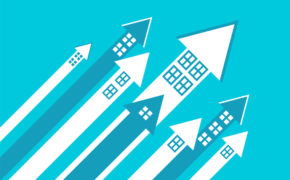16 Answers to The Biggest Home Buying Questions
For first-time homebuyers, the mortgage process can seem overwhelming. After all, purchasing a home is a major investment! Because we want you to have a head start on your journey to homeownership, we’re breaking down everything you need to know about mortgages by answering 16 of the most common home buying questions we receive from customers.
1. Should I rent or buy?
This is probably one of the biggest questions first-time homebuyers ask themselves. However, the answer isn’t always cut and dry. For some people, renting can be a great option. For others, buying a home is the better route to take. It all depends on your situation.
Before you make a decision to rent or buy, here are some important things to take into consideration. We also have a handy calculator that can help you crunch the numbers and get a realistic comparison of how much it would cost to rent vs. buy.
2. I want to buy a house, but don’t know where to begin. Where should I start?
When it comes to buying a house, getting a letter of pre-approval is the first, and arguably most important, step. Trust us, this piece of paper is pretty powerful! In fact, some real estate agents won’t even work with a buyer until they have one.
Not only will a letter of pre-approval help you determine how much you’re eligible to borrow, it will also give you more leverage with sellers when it comes time to make an offer. Here are several other benefits of getting pre-approved for a mortgage loan.
3. What type of mortgage lender should I use?
The key to navigating the home buying process with ease is finding a mortgage lender who will be attentive to your needs and make you feel comfortable and confident with your decision to buy a home. Here’s a guide to finding the type of mortgage lender that’s right for you.
4. How much house can I afford?
Before you start searching for homes, it’s important to determine what price range you’re looking to stay within. While having a letter of pre-approval will help you determine how much you’re eligible to borrow, you’ll want to factor in any other financial obligations you have to get a true idea of what you can reasonably afford within the confines of your budget.
We highly recommend adhering to these rules of thumb when determining how much house you can afford. You can also use this mortgage calculator to determine the amount you can afford from a lender’s point of view.
5. How much will my monthly mortgage payment be?
There are several factors that go into determining the cost of your mortgage payment. including the loan amount, the length of the loan, your interest rate, property taxes and homeowner’s insurance. Use this calculator to estimate your monthly mortgage payment based on the purchase price of any home and your down payment contribution.
6. How much money do I need for a down payment on a house?
While conventional wisdom says you should have a 20% down payment, this is not required to get a mortgage. The truth is, there are a number of low down payment loan options that allow buyers to purchase a home for as little as 3% (and in some cases 0%) down! It all depends on which type of loan you choose.
There are also down payment assistance programs offered through the Michigan State Housing Development Authority (MSHDA) that can help qualifying individuals with the cost of homeownership. As one of the top MSHDA lenders in Michigan, we work hard to make sure individuals are educated about financial assistance programs offered through the state.
7. Can I use gift money as part of my down payment?
According to the National Association of REALTORS®, 27% of first-time homebuyers receive gift funds from a relative to help make a down payment. While using gift money is a perfectly acceptable form of down payment, there are some guidelines that need to be followed.
8. What kind of credit score do I need to buy a house?
Your credit history has a significant impact on your ability to qualify for a mortgage loan. While most mortgage lenders require a credit score of at least 620, the higher your credit score is, the lower your interest rate will be. Want to increase your score? Follow these tips for boosting your credit.
9. Do student loans affect a mortgage application?
The short answer is yes. However, Fannie Mae recently announced new changes to its underwriting requirements that will help more people with student loan debt qualify for a home loan. Read this article to find out what these new changes mean for you.
10. What can I do to improve my chances of qualifying for a loan?
This is a common question we often hear from our customers. While there are many factors that go into evaluating a borrower’s creditworthiness, there are three main components lenders use to determine how qualified an applicant is: credit score, down payment and income. Read this blog post to understand how these elements affect your ability to obtain a mortgage and what you can do to improve your chances of qualifying for a loan.
11. Are there special home buying programs that I should know about?
When it comes to getting a mortgage, one-size-fits-all solutions don’t apply. Everyone’s financial situation is different! There’s more to choosing a mortgage than deciding between a fixed or adjustable-rate mortgage and getting a 15-year or 30-year loan. There are many different types of mortgage loans, each with their own unique advantages.
Here are a couple mortgage loan options you may not have known existed:
- HomeReady loan. This is a low down payment conventional loan that enables buyers to purchase a home for as little as 3% down. This program is unique in that it allows a non-borrowing member’s income to be considered on the loan.
- Home renovation loan. The cost of renovating a house can be expensive, especially for first-time homebuyers who are oftentimes using most of their financial resources for their down payment. A home renovation loan allows homebuyers to roll the cost of the house and home improvements into one mortgage loan.
- Rural Development loan. If you’re not keen on city living, and would rather move to a rural area, the USDA Rural Development (RD) loan is a great option to consider. Advantages of RD loans include zero-down financing and the ability to finance repairs. To find out if a property qualifies for this program, visit the USDA Rural Development website.
- VA loan. Exclusively for veterans, VA loans come with special advantages that other mortgage loans don’t have. Available to members of the United States Armed Forces who are on active duty or reserve, as well as widows or widowers of veterans, benefits of VA loans include flexible credit requirements, lower rates, zero down payment and no private monthly mortgage insurance (PMI).
12. What is an Earnest Money Deposit?
Earnest money deposits (EMDs) are made to a seller as a way to show the buyer’s good faith in purchasing a home, and is often a percentage of the listing price. While an EMD is essentially like paying part of your down payment early, you should be prepared to have these funds ready and available as soon as your offer is submitted.
13 How can I make my offer competitive in a seller’s market?
Should you find yourself in a bidding war, there are several things you can do to make your offer stand out in a competitive market, such as securing a letter of pre-approval, increasing your down payment or writing a letter to the seller.
14. How long does the home buying process typically take?
To help you better understand the timeline for purchasing a home, we’ve developed an infographic that outlines each step in the home buying process. Once you find a house and your offer is accepted, it usually takes 30 days to close. However, some loan programs have specific requirements that could extend the closing process. Consult with your loan officer about how long the closing process should take based on your loan type.
15. What is an escrow account and how does it work?
A mortgage escrow account is set up by a mortgage lender prior to closing and will be used to collect and store additional funds needed to pay annual property taxes and homeowners insurance premiums.
These funds are divided equally over the course of a year and collected as part of your monthly mortgage payment. It’s like having a separate savings account that’s set up specifically to manage additional costs associated with homeownership.
16. Why do mortgage lenders need so much information?
Buying a house is a major investment, both for the buyer and the lender. Not only do mortgage companies want to assess their risk of lending, they’re also there to protect homebuyers’ best interests, too.
Collecting bank statements, pay stubs, tax returns, and other documents, enables lenders to paint a clear picture of a borrower’s financial situation and better understand their ability to purchase a home. By analyzing this information, lenders will be able to determine whether a borrower can meet required lending guidelines, and determine which loan programs are in the buyer’s best interest.
Whether you plan on buying a house this summer, or a few years down the road, there’s no such thing as being too prepared. Feel free to browse our blog for home buying tips and mortgage advice.
Have questions? Send us a message! We’d be happy to connect you with a lending expert on our team who can help you take the next step in your home buying journey.
- applying for a mortgage
- applying for a mortgage loan
- bidding on a house
- bidding war
- boost credit score
- buying a home
- buying a house
- credit score
- down payment
- Fannie Mae
- first-time homebuyer
- home buying process
- home renovation
- home tips
- house hunting
- how much house can I afford
- Michigan mortgage lender
- mortgage advice
- mortgage loan
- MSHDA lenders
- MSHDA-approved lender
- pre-approval process
- questions first-time homebuyers ask
- questions to ask a loan officer
- Questions To Ask Before Buying a House
- real estate
- Ross Mortgage
- Ross Mortgage blog
- Ross Mortgage Corporation
- top MSHDA lenders
- VA loans










